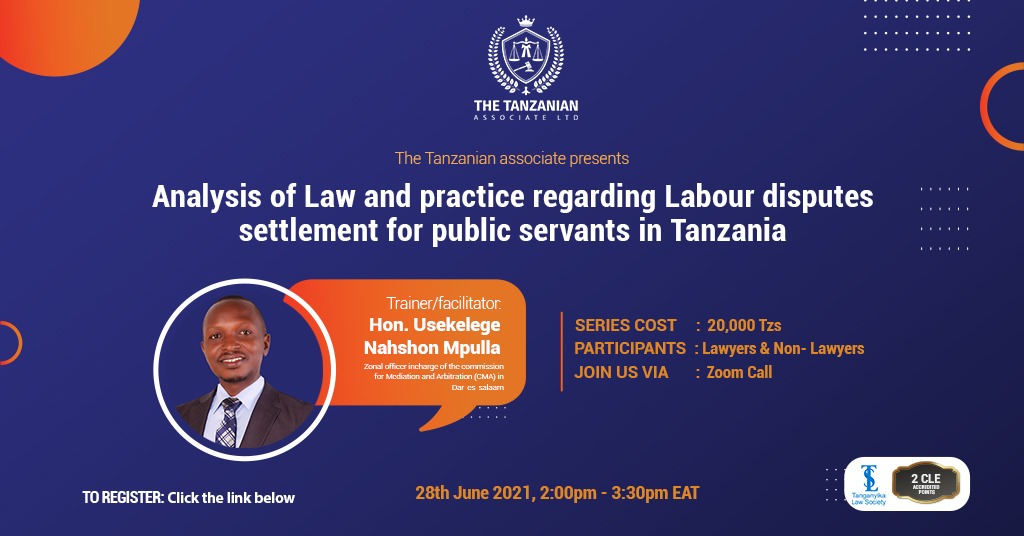
LEGAL INFORMATION
INCOME TAX
This article summarises income tax in Tanzania as of the date of publication and highlights key features of income tax, including 16 things every Tanzanian should know concerning income tax.
“The hardest thing to understand is the income tax” Albert Einstein
16 things every Tanzanian should know about income tax.
With the new government’s efforts to ensure that every Tanzanian and Tanzanian company pays their taxes so as to ensure growth of the country, the Tanzanian Associates team saw it fitting to provide legal information on income tax in Tanzania in a nutshell. Paying Tax on income earned in the country is an obligation of every individual or entity that earns an income in the country. Therefore it is necessary to provide legal information on the matter, so as to ensure compliance and avoid unnecessary fines and penalties.
WHAT IS INCOME TAX?
Income tax can be simply defined to mean tax paid on income. This means individuals and legal entities (companies) are required by law to pay tax on all their income. However not every income is taxable and not every person is required to pay income Tax. Who and how much income one should pay is provided for by law. In Tanzania, income tax is governed by the Income Tax Act revised edition 2008 and subsequent amendments, the Tax Administration Act 2015, The Income Tax Regulations, EFD Regulations, The Income Tax (transfer pricing) Regulation 2014, and the Transfer Pricing guidelines. With the new government awakening to track any tax defaulters understanding Income tax laws could not be more important for those who want to be in line with the law.
WHAT IS THE MINIMUM TAXABLE INCOME FOR AN INDIVIDUAL?
The minimum monthly chargeable income currently is 170,000 Tanzania shillings. Any Individual who earns more than 170,000 Tanzania shillings is required to pay income tax. Income tax is paid progressively per the individual income meaning the more you earn the more income tax you pay. There are 4 tax bands for individuals.
To find out which tax band your income currently falls in see http://www.tra.go.tz/index.php/income-tax-for-individual https://www.tra.go.tz/images/uploads/Laws/taxtable2017.pdf
http://www.tra.go.tz/Images/headers/THE-FINANCE-ACT-2017-CHAPA-Final.pdf
IS THERE GRACE PERIOD FOR COMPANIES ON INCOME TAX?
No. From 1997 there is no grace period for companies for not paying income tax. Corporate entities in Tanzania are required to pay a fixed 30% rate on their net profit as income tax from their first year of operation. However, they are some exception to the rule. Companies listed in the Dar-es-salaam Stock Exchange are required to pay only 25% income tax on their first three years of business. This is to encourage more companies to list companies in the Stock Exchange. Another exception to the rule is companies that fall under the Export Processing Zones. These companies are given special reliefs by the Tanzania Investment Center. A good example of such companies is a factory aimed at exporting. See http://www.tra.go.tz/index.php/103-tax-incentives/171-tax-incentives-granted-for-investments-outside-freeport-and-free-economic-zones
WHAT IF MY COMPANY IS MAKING LOSS DO I STILL PAY INCOME TAX
Yes and no. Companies that make loss are exempted to pay tax for the first 2 years. Thereafter such companies are referred to as perpetual-loss-making cooperation’s liable to pay 0.5% of their gross turnover on the third year of perpetual unrelieved loss as income tax. The losses are however carried forward to be deducted from future profits.
IS INCOME TAX PAID AT THE END OF THE FINANCIAL YEAR?
No, Income tax is paid within four quarters, meaning that income tax is paid in four installments in a financial year. The first quarter starts at the start of a person’s financial year and ends three months after the beginning of the year of income. E.g. if your financial year starts in January you are required to pay the first installment of income tax by end of March since that is the first quarter of your year of income.
WHO ESTIMATES HOW MUCH I SHOULD PAY IF I DO NOT KNOW HOW MUCH PROFIT I WILL MAKE IN THE YEAR OF INCOME?
A person is responsible for estimating how much he or she should be paid according to previous trends or income from persons doing similar business. This is because it is the person who knows best how much is anticipated as income. This is known as estimated tax payable.
CAN I CLAIM BACK MY INCOME TAX IF I DO NOT MAKE A PROFIT AT THE END OF THE FINANCIAL YEAR?
Yes. The law provides that a person can claim an income tax refund as soon as possible if they have over-paid income tax. The Tax Commissioner is required to refund persons with such claims within 90 days. However, the Commissioner has the discretion of refunding or retaining the surplus income tax as credit in your account. These credits can be utilized in the following financial year.
HOW WILL I KNOW IF I AM DUE FOR A REFUND OR NOT?
An individual doing business is required to file a return of income within six months of the end of the financial year. Once you file return of income you will know your current position of income and if you are due for a refund.
HOW WILL I KNOW IF I HAVE PAID INCOME TAX?
Income tax can be paid in several modes such as
- Cooperate tax
- Individual income tax
- Withholding tax
DO NON-RESIDENTS PAY INCOME TAX?
Yes, Non-residents also pay tax on the income that has been sourced in Tanzania only. There are ways of determining whether a person is a resident or not and is stipulated in the laws.
WHAT IS WITHOLDING TAX?
Withholding tax is a mode of payment of income tax that is withheld at source. Meaning it is the tax that is collected by agents of the government from the income of the individual or entities. E.g. pay as you earn (PAYE) this is a form of income tax that is collected by the employer as an agent of the government from the employee and paid directly to the government without it first going to the employee. There are other forms of withholding tax deducted from payments such as rental income, interest rate royalty and service fees.
WHAT IS RENTAL INCOME TAX?
It is the type of withholding income tax that is deducted by a company or an individual doing business from a landlord rent. If a company is renting premises from a landlord or landlady it is required by law to withhold 10% of the gross payment as rental income tax payable to the government.
WHAT IF I AM NOT A COMPANY CAN I WITHHOLD RENTAL INCOME TAX OF MY LANDLORD AS ITS AGENT?
Not everyone can act as an agent for the government to withhold tax, individuals who are not doing business cannot withhold tax on behalf of the government.
DOES THAT MEAN MY LANDLORD OR LANDLADY IS NOT DIRECTLY RESPONSIBLE FOR PAYING RENTAL INCOME TAX?
No, the landlord is required by law to pay 10% of their gross rental income as income tax. Therefore, where an individual as an individual rents a property from a landlord/landlady it is the responsibility of the landlord/landlady to ensure the pay income on the gross payment of the payment they receive as rent. The law however provides in the event a landlord does not pay income tax on the rent paid by the tenant both the landlord and tenant shall be jointly and severally liable for none-payment of income tax. The tenant inclusion is to ensure that tenants make sure their landlord and land lady pay income tax on their rent.
ARE BANKS ALLOWED TO DEDUCT WITHHOLDING TAX FROM MY BANK ACCOUNT?
Yes, Banks are required to deduct income tax from the interest incurred in your account since this is deemed as income on your part. Banks are agents of the government and therefore have the mandate to withhold income tax on behalf of the government and pay it directly to the government on your behalf. The bank is allowed, to withhold 10% as withholding tax on the interest paid in your account.
DO I NEED TO PAY INCOME TAX ON ROYALTY FEES?
Yes, all income generated by a person is subjected to income tax. Therefore, whatever royalty a company or a person earns from film, patent, trademark, secret formula, books is subjected to income tax at a specific rate provided for by law.
IS INCOME GENERATED BY A NON-RESIDENT PROVIDING A SERVICE IN TANZANIA TAXABLE?
Yes, income generated from providing a service in the country by a non-resident is taxable no matter how short the service offered is. E.g. If Kofi Olomide is to perform a show in Tanzania the income he generates in the country is taxable. However, it shall be the duty of the organising host company to ensure that income tax is withheld on behalf of the government before they pay Kofi Olomide. It is also important to note that any company providing service to the government e.g. consultation is also subjected to income tax. The government will withhold 2% of income tax before paying the company or individual.
DO I HAVE TO PAY INCOME TAX ON INCOME GENERATED OUTSIDE TANZANIA?
Yes, if you are a resident person and no if you are a non- resident. A resident person is taxed on income irrespective of the source i.e. worldwide income.
By L.J.Minde
Legal Consultant
Advocate of the High court of Tanzania, LLM International Law, LLB with Hons
The Legal information given is not a legal advice and does not create a client and company relationship. The Tanzania Associate Ltd is company that provides different innovative legal solutions in Tanzania. For more information visit our website. www.thetanzanianassociate.com


